Olympic champ Alisa Camplin’s secret heartache after son’s death
Alisa Camplin faced many varied obstacles on her road to an Olympic gold medal but nothing prepared her for the challenges she would face through the loss of her first child, writes Hamish McLachlan.

VIC News
Don't miss out on the headlines from VIC News. Followed categories will be added to My News.
Alisa Camplin is an extraordinary woman. The obstacles in her path to an Olympic gold medal were many and varied but nothing compared to the challenges she faced through the loss of her first child.
HM: Alisa, it’s 6:30am with you in Hong Kong, what are you up to?
AC: Eating vegemite on toast with a rare, quiet, sleeping house!
HM: You arrived in Hong Kong 18 months ago and since you arrived, you’ve got the trifecta?
AC: I hope it finishes at three! Typhoon, mass protests and COVID-19! It’s been a complicated time, but we love it here and it’s been great for my keynote speaking on resilience.
HM: Going back a little, were you born into a sports-mad family?
AC: I grew up in Melbourne’s outer east, in a suburb called Viewbank surrounded by paddocks with cows in them — a great little community. There were 14 boys in the street, and the 3 of us Camplin girls. It was really competitive, lots of sport, lots of bruises. We rode bikes, ran, played cricket, footy and chasey through the paddocks.
HM: Did you start your varied sporting career with ballet?
AC: It was brief, my ballet career. The teacher said to mum, “You can bring the second one back, but Alisa, she’s no dancer!”. Mum put me in the car that weekend and we went to Little Athletics. In under 5’s and 6’s I was in the boys’ races, because I was winning girls’ races by 40m in a 100m run. I remember Dad saying to me, “You’re better off coming last in the fast race than coming first in the easy race”. I spent so much time growing up with and competing with boys, trying to win races in the street on my bike, climbing trees and being so determined to get to the absolute top. That environment really fuelled my competitive nature.
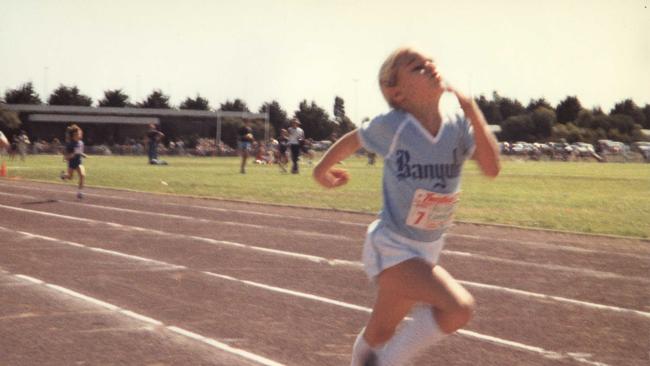
HM: Your mum and dad showed you the best of Australian sport, and it inspired you.
AC: My mum’s really passionate about sport. She’d get me up in the middle of the night to watch the America’s Cup, or to watch Greg Norman in the Masters, and she’d sit up all through the night watching sport, and still does now. She takes her annual leave during the Olympics so she can watch it around the clock.
HM: And your dad?
AC: Dad loved footy but he followed coaches, not a football club! He’s a thinking man’s man, he watched sport from an analytical perspective. He loved the strategy and tactics, and I learnt from that. I remember him telling me about some of the greatest runners of all time, their sacrifices and the detailed plans that they put in place to win.
HM: You would come to know sacrifice well. Gymnastics was before long distance running, and was a key factor to your ski jumping career?
AC: Correct. As I moved into my teenage years, I saw gymnastics for the first time and loved it. I’d lost a bit of passion in track and field, because I was still a kid competing against women. In gymnastics I picked up a couple of state medals through level seven and eight but developed stress fractures in my lower back at 16. I took a year off and then tried hockey but didn’t really have the skill. I started crewing for a friend who sailed, and we came runners up in Nationals, but eventually I found my way back to track and field. My old running coach, Tom Kelly, who’d helped a lot of Australians get to the Olympics, rang me up when Sydney was awarded the Olympics and said …
HM: … Marathon time.
AC: Exactly … he told me “You run like Rosa Mota (Gold medallist in 1988) — this is your chance to get to the Olympics”. He knew I had unfinished business with my Olympic dream. At the time I was 17, and I threw myself into it, but I didn’t love it. I was putting in the work, but the difference between gymnastics and running is that gymnastics is a never-ending quest to perfection, try and try again, new trick, get it, master it, then next one. It keeps going. Step up, push yourself and learn something new. In track and field your vying for seconds, you push yourself through barriers of pain, and more pain and then vomit. And repeat. Then everything changed, the Summer Games were suddenly off my radar.

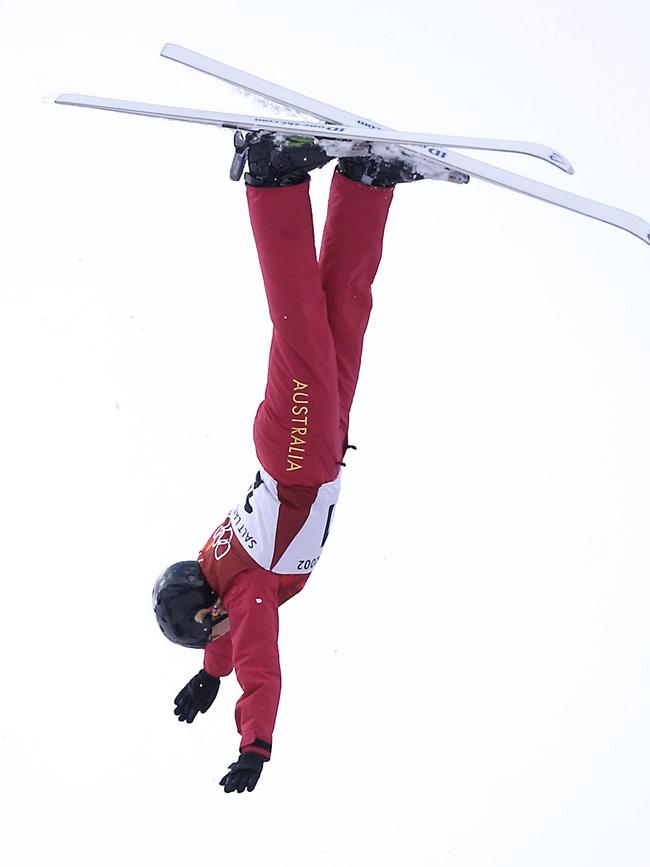
HM: Because?
AC: I saw Kirstie Marshall on TV at the ’94 Olympics and I thought to myself, “That’s it! This is the sport, it’s going to be the Winter Olympics!”
HM: Not a natural progression for someone who’d never skied!
AC: Our family was very middle income, we’d never been skiing, but when I started at university I met a guy whose family was a skiing family. I followed them along to a ski expo, and Jacqui Cooper and Kirstie Marshall were there jumping on trampolines, raising awareness of the sport. You could get on the bungee harness and have a jump, and there was this guy saying, “Can you do a double somersault? Can you do a twist? Can you do a triple?” He was one of the Godfathers of the sport.
HM: Geoff Lipshut?
AC: Yep! The CEO of the Olympic Winter Institute. It was a young sport, but we had the coaches, the expertise and the role models. I had 8 years between 1994 and 2002 to pull off my plan. I said to Geoff, “If you teach me how to ski, I promise I’ll come down to the pond in Lilydale and do a thousand jumps. I’ll shut up, and I’ll listen, and I’ll work”.
HM: That’s where an Olympic journey began …
AC: A lot of people in the broader skiing community thought I was a lunatic! I bashed myself up and sprayed my equipment across the snow at Mount Buller learning to ski, all so I could get down that water ramp in the summer and be ready to do jumps on snow the next year!
HM: Where you knew you would be OK, because of your gymnastics background?
AC: Well, hopefully … I had all these skills from gymnastics and the sports I’d done previously, I just had to find the right place to apply them. Aerial skiing was the perfect mix of strength, bravery, discipline, acrobatics, mental skills, and it had all the fun of gym.
HM: It took a lot of hours, and a lot of sacrifice.
AC: Everything that is good does, doesn’t it? I had to work my tail off to pay for it, I was coaching gymnastics three nights a week, delivering pizza on Tuesday and Thursdays, working part time for a bank as a contractor, and cleaning people’s houses on the weekends. I couldn’t afford to buy skis. I’d finish coaching gymnastics at 9.30pm on Friday, get in my car and drive to the mountain, put chains on my car at 1 o’clock in the morning, and by 7am the next morning I was on the hill. I did that for about 3 years.
HM: How many times do you go off the ramp into the water before you think, let’s go do this on hard ground where I can actually snap my neck?
AC: I had to do a minimum of 1000 upright jumps, and 500 back somersaults, and then I had to be tested. Geoff Lipshut was coming out, and I wanted to show him that I could do the work when no one was watching. I remember when I attempted my first somersault on snow, I was pretty nervous, and there was a girl in front of me who everyone had very high expectations of as a junior. She stopped right before the jump and said, “I’m not ready, I’m not ready”. I remember thinking, “This is my chance to prove that I’ve got what it takes!” I stepped out and said, “I’ll go next”.
HM: How did you go?
AC: I stood at the top of the inrun, and I remember thinking “This is scary, but it’ll be scary in five minutes, it’ll be scary tomorrow … nothing is going to change, now is the time”. I’d done everything they’d asked of me, so I counted down from three and figured whatever happens on the other side of the jump, I can deal with later! I did one and a half somersaults, landed on my back and cracked my first rib! The rule was if you didn’t land, you weren’t allowed to catch the lift back up. You had to put your skis over the shoulder and hike back up the hill. I ran up the hill, and then I did eight more jumps.
HM: Tough! How many years of crashing was it before you thought, “I might get to the Salt Lake Olympics?”
AC: In early 1998 our National development team was taken from Europe over to North America so our coach could support Kirsty Marshall and Jacqui Cooper making an assault on the Nagano Games. We all trained together, and Australia had two extra World Cup competition spots. They said, “Whoever trains the best, and lands the most jumps, will earn the right to a spot and compete for Australia”. I remember the coaches watching us, but I was smashing myself all over the place doing simple twisting somersaults. One of them came over, grabbed me off the side of the lift and said, “This doesn’t look good for our nation!”.
HM: That was in ’98 … and you were still smashing yourself up?
AC: Yes. I was told, “You need to find your landing gear, or we’re pulling you from training”. I was mortified, angry, but determined. I landed my next three jumps in a row, and then training ended. That night they had the development team in a room with the national coaches, and they said, “Well done, the two people that are going to compete are these two” and that did not include me! The World Cup athletes all walked in for the briefing, and I was asked to stand outside — I just cried. At that point I remember saying to myself, “This will never happen again. I will never allow doubt to come into a selector or coach or judge’s mind about me ever again”. It was a massive turning point for me and “leave no doubt” became my mantra. We had a training camp soon after Nagano and I just kept landing. They allowed me to join Kirstie and Jacqui on the World Cup team the next year.
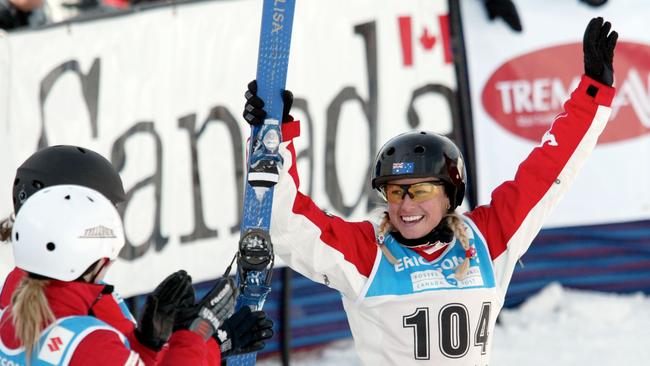
HM: And you never looked back. After injury and missed selections, you became a top aerialist in the world — but almost missed the Salt Lake Olympics in 2002 with injury?
AC: I had a great summer and pre-season leading into the Olympics. I’d hired a technical coach and sports psychologist and I took massive leaps. I had back-to-back wins on the North American circuit, but just after Christmas I got caught in head wind and landed short on a training jump. I broke both my ankles, and burst into tears thinking my Olympic dream was over!
HM: About six weeks out from the Games?
AC: Yep. I crawled around on my hands and knees for about three of those six weeks. I spent my time visualising in the mornings and afternoons, sweated it out doing core and cycling in the gym in the evenings. When I went to Salt Lake, I had visualised thousands of perfect jumps and different scenarios playing out, and that was the majority of my preparation for the Olympics. I became the world’s greatest visualiser!
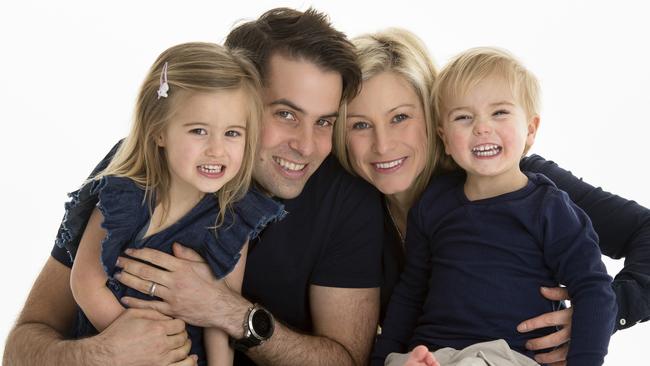
HM: Salt Lake played out perfectly.
AC: Amazingly. I went in with essentially no jump training, and a body that was suspect. I qualified second in the semi-final, and got my ticket to the dance. I knew subconsciously that it was all possible, but it felt like I had a rising ocean at arms length, and I wasn’t sure if I would sink or swim if I couldn’t hold it back. I worked really hard to manage my time and thoughts to contain my nerves on the day off, which we had pre-planned to fill with arbitrary non-thinking activities. My coach and I went down to Home Hardware, bought black spray paint and sandpaper, and came home to sand back and spray paint my fluorescent green boots. We turned my boots, helmet and gloves all black so I’d look and feel more streamlined in the air. The night before the Olympic final I was unusually quiet. I couldn’t move half a metre away from my coach! I ate my dinner, went home, spoke to my sports psych on the phone and went to sleep. Then I woke up the next morning and I felt really, really good. I felt ready. I had no doubts. I remember arriving at the jump site, and standing next to the lift waiting for it to open. Every day I’d said hello and good morning to the volunteer who worked at the lift, and on the day of the final he said, “Ahh, you’re the first one here!” I said, “That’s because the early bird catches the worm” and we both laughed. The final turned out to be the most perfect day. Which is ironic, because I had rehearsed every possible bad situation that could have gone down in that competition. I visualised and trained in all sorts of bad weather, but the final in Salt Lake was a beautiful, calm, sunny day. I did everything I needed to do — I’d turn my brain on, I’d turn my brain off, I didn’t watch anyone, I didn’t do anything other than what we’d rehearsed. No clutter, no noise. I executed the plan, stuck to the process and it worked. I knew that I had the degree of difficulty in my jumps, and that if I landed both my jumps, that I would get a medal. It all depended on how nicely I did them. I did them well enough to win Gold.
HM: Finally an Olympic Gold Medallist … as an Olympic obsessive — but you wanted more.
AC: The great Olympic memories that really shaped me were Debbie Flintoff-King, coming from miles behind in the 400m hurdles, and not giving up until she lunged across the line to take Gold. Watching Cathy Freeman perform under the weight of a nation, and then listening to Ian Thorpe say that for him it wasn’t about the medals, but about finding his greatest performance within himself. For me, after I won in Salt Lake, I thought I was going back to work at IBM so I could pay off my coaching debts, but I realised the minute I won that I wanted to win the world championships the next year. I came from a country where our champions dominated. My hero’s weren’t one hit wonders. I wanted to own a segment of time in my sport. I’d worked so hard to get to that point, I wanted to win again and again, and prove that my Olympic gold wasn’t a fluke. People in the sport knew that I was thereabouts, but Australia didn’t. So the World Championships were important to me. Almost 12 months later, I executed two near perfect jumps and set a new world record to be crowned World Champion. That was my ultimate performance!
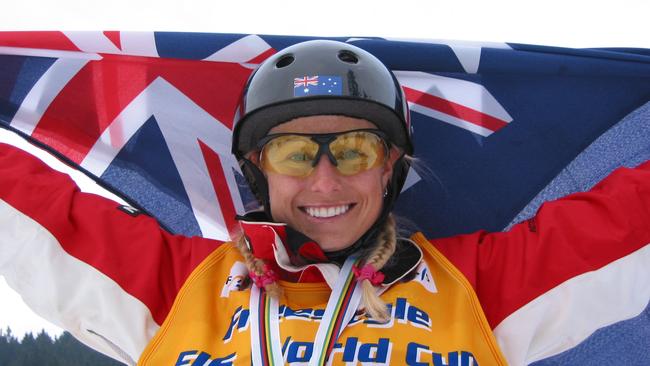
HM: You seem very driven — and focused on the detail of things. And values and respect. Has that always been the case?
AC: I guess I was always taught it’s the little things that count. I used to have to shake hands with Dad, we made deals a lot! “You’re going to wash my car inside and out, and I’m going to come and inspect it. $5 if it’s perfect — we got a deal?” “Deal”. “And if I’m not happy with your work, you’ll fix it?” “I will”. Your word is your honour. If I tell you I’m going to do something, you will get the absolute best I can deliver to you. It’s funny now, with my kids I’m doing the same thing … I’m like my parents were with my two!
HM: Your two little ones are very lucky. Tragically, you lost your first son Finnan at just 10 days old with congenital heart disease. I’m sure there’s nothing that can prepare you for something as life changing as that?
AC: No, I don’t think so. It is interesting though the way life plays out. I remember being so thankful during that period of time, that I’d picked the right partner in life. I was also grateful for all the mental training I’d had in sport, because when we found out Finnan had a problem, my husband took it really hard. I sort of compartmentalised my emotions and focused on what I could control. The plan was for me to stay calm and positive and eat as much food as possible to get him closer to 3kg. We were told, the bigger the baby, the greater the lung capacity, and the bigger the chance that the baby could endure the surgery.
HM: You found out about 10 days before he was born there was a serious issue?
AC: Yes — it was late in the pregnancy around 33 weeks. They gave me steroid shots which was very odd for an athlete, but the steroids were to accelerate the building of Finnan’s lung capacity. In that period, I really had this belief that if I did everything I could control, then modern medicine would go our way.
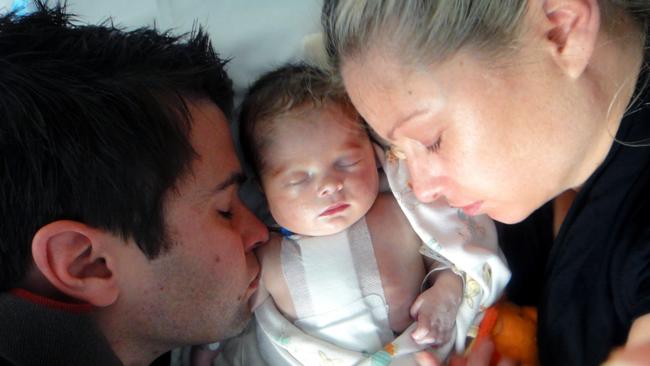
HM: You’d always been process driven …
AC: … that’s what I knew, process, process, process. That had worked for me in the past. We had a plan, excellent doctors, we were totally informed. In sport, you get a world class coach, the world class sports psych, and the world class team around you. Same in business. I’ve always been about surrounding myself with good people, and we got everyone around us.
HM: The conversations became frightening very quickly?
AC: They said, “If Finnan comes out, and he takes a breath and survives the first three hours, then we have a chance at fixing his heart”.
HM: Hard to imagine being told your baby’s life is in real danger.
AC: You never think it will happen to you. We tried to take things one day at a time, Oliver was a pillar of strength and helped make sure we absorbed equally the good and bad news, and that we didn’t over celebrate or over despair.
HM: And then the worst news comes.
AC: When we got to the 10th day, they asked us to come into the room that you don’t want to be in, the one with tissues on the table. They said, “Things have gone in a really bad direction”. Olly had already pre-prepared a bit emotionally, but I was knocked for six, just staggered that modern medicine didn’t work out. From that point, you get given a little card about SIDS and Kids, and the hospital were unbelievable in helping us create special memories in that last 24 hours with our son. We knew that this was big, and we didn’t want it to come back later and break us as individuals or as a couple. The statistics of families that end up in divorce after the loss of a child are huge, and we just didn’t want that to be us.
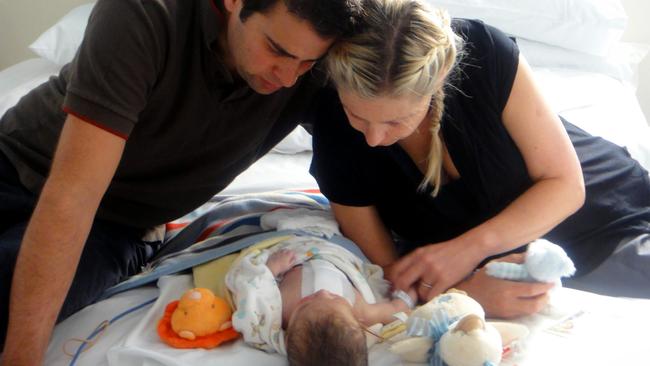
HM: How did you try and ensure it doesn’t?
AC: Our next step was counsellors. I happened to read a book that someone gave me about parents who had lost children. I sat in the Botanical Gardens by myself, reading it and sobbing. I read things in that book about what really hurt people, the process of recovery, and I realised that we had a great gift, to do something significant to help the Royal Children’s Hospital. So we created Finnan’s Gift, and the support from the community carried us through the worst parts of our grief. We were so appreciative to everyone who donated and helped us buy the new equipment for the hospital, so we decided to keep going as a way of thanking everyone who’d helped us. We’ve raised almost $3M now which has been amazing, but interestingly Finnan’s Gift also gave people a way to softly check in on us. People would say, “How’s Finnan’s gift going? And by the way, how are you? It’s really hard when people are grieving to feel like you can do anything, so that really was a wonderful mechanism.
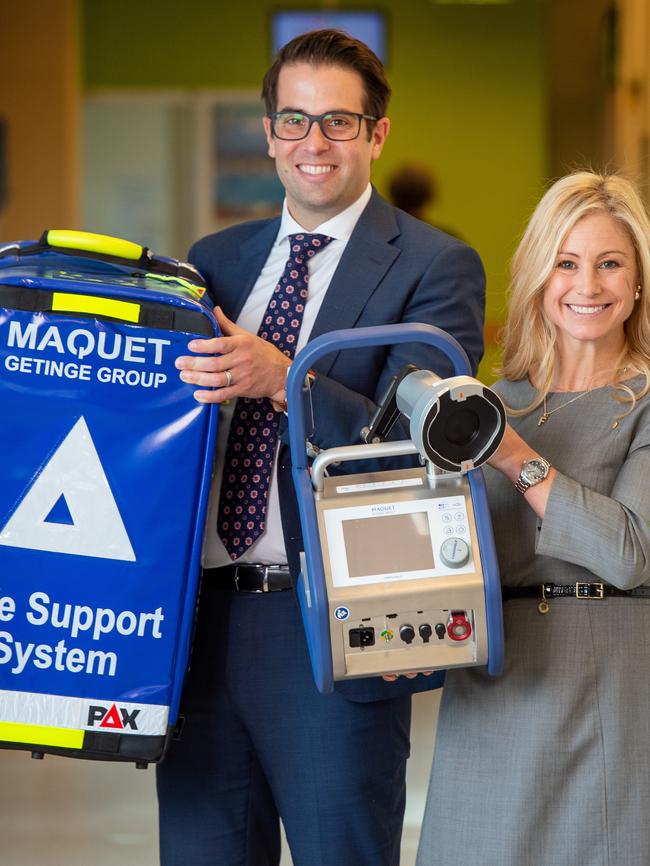
HM: Is your life, or your marriage, ever the same after losing a child? I remember my grandmother, who had to bury two children, her son and her daughter both in their 70s. She lived to 103. I remember walking out of the funeral, and I held her hand walking her to the car. She said to me, “No parent should ever have to bury a child”. I couldn’t imagine the strain on a young couple, with a young child. The innocence, and all that life ahead, lost.
AC: After Finnan died, I didn’t want to compartmentalise my grief, I tried to work through things. But it was hard, I didn’t want to ‘recover’ or ‘move on’ or forget. But I also knew that there are things you can and can’t control in life. In sport, if I woke up and it was a windy weather competition, I couldn’t control that. What I could control was my response to it, and I could prepare in advance to be ready for weather like that. On a windy day in competition, I’d think “This is my advantage, I’m going to make the best of this day”. But you can’t prepare for the loss of a child, we could only do our best in the aftermath.
HM: Your training for Gold helped you with something horribly unexpected.
AC: I’m sure without all the mental training in my career it would have been so much worse. I did want to heal, we wanted to make Finnan’s life count for something through Finnan’s Gift, and by doing something special for the hospital we hoped to help other parents avoid what we went through. I also knew we could choose to stop asking ourselves the questions that there was no answers to. Why us? Why did it happen? Why didn’t things work out? We could have driven ourselves mad searching for those answers. Talking about it together and realising there were no answers to those questions allowed us to move through it. As a young couple we tried to use the time after losing Finnan to give ourselves a break. We didn’t try to get pregnant straight away, we just needed time. We invested that in ourselves, and our experiences. We used it to try and strengthen ourselves. The process of trying to get pregnant again was long and fatiguing, but when our children came along, we were just so grateful.
HM: Two littles ones now – and two Olympic medals. You’ve lived an unbelievable life. Thank you for sharing.
AC: It’s been a real trip down memory lane, and I’ve talked way too much!
HM: I’ve enjoyed it.
To donate to assist The Royal Children’s in Melbourne, go to finnansgift.com
